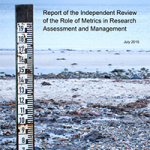“Responsible metrics” refers to the ethical and appropriate use of citation-based metrics (e.g. citation counts, Journal Impact Factor, H-index), altmetrics (e.g. how many times research is mentioned, used, saved and shared on blogs, social media and social bookmarking services) and other quantitative means of evaluating research.
It applies to everyone involved in using or producing these metrics e.g.:
- researchers
- funders
- institutions (i.e. universities and other bodies that employ researchers)
- publishers
- organisations that supply metrics
The idea is to offer guidelines for good practice that help prevent scenarios such as:
- a journal article being judged solely on the journal it is published in rather than on its own merit
- universities focusing on improving their place in a ranking list, when the completeness of data and appropriateness of measures the list uses are contested
- employers using arbitrary metric thresholds to hire and/or fire staff
- the assessment of research in general being skewed by the fact that metrics can be gamed and/or lead to unintended consequences
Adopting a responsible metrics approach is seen as good practice across the research community.
The Metric Tide is an important report published in 2015, which helped foreground and frame discussion of responsible metrics (in the UK at least). It states:
“Responsible metrics can be understood in
terms of a number of dimensions:
Robustness: basing metrics on the best possible data in terms of accuracy and scope;
Humility: recognising that quantitative evaluation should support – but not supplant– qualitative, expert assessment;
Transparency: keeping data collection and analytical processes open andtransparent, so that those being evaluated can test and verify the results;
Diversity: accounting for variation by field, and using a range of indicators to reflectand support a plurality of research and researcher career paths across the system;Reflexivity: recognising and anticipating the systemic and potential effects ofindicators, and updating them in response”
Other important milestones in responsible metrics include the San Francisco Declaration on Research Assessment (DORA), formulated in 2012, and The Leiden Manifesto for research metrics, which was published in 2015.
Expect to hear more about this issue as research funders begin to implement the principles of responsible metrics and demand that organisations receiving grants from them do likewise – see Plan S and Wellcome’s Open access policy 2021.


